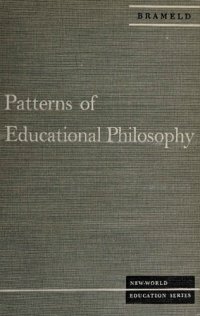
Ebook: Patterns of Educational Philosophy: A Democratic Interpretation
Author: Theodore Brameld
- Genre: Other Social Sciences // Philosophy
- Tags: education
- Year: 1950
- Publisher: World Book Company
- City: New York
- Language: English
- pdf
A philosopher and visionary educator who developed the reconstructionist philosophy of education, Theodore Brameld spent a lifetime working for personal and cultural transformation through education. Influenced by John Dewey's educational philosophy, Brameld urged that schools become a powerful force for social and political change. He welcomed reasoned argument and debate both inside and outside the classroom. After completing a doctorate in philosophy at the University of Chicago in 1931, Brameld taught at Long Island University and spent much of his career at New York University and Boston University.
Starting in 1950 with the publication of Patterns of Educational Philosophy: A Democratic Interpretation, Brameld developed his cultural interpretation of four philosophies of education: essentialism, perennialism, progressivism, and reconstructionism. He viewed essentialism as an educational philosophy concerned mainly with the conservation of culture; perennialism as centering on the classical thought of ancient Greece and medieval Europe; progressivism as the philosophy of liberal, experimental education; and reconstructionism as a radical philosophy of education responding to the contemporary crisis. In his writings throughout the 1950s, Brameld maintained that reconstructionists–like progressivists–opposed any theory that viewed values as absolute or unchanging. Values must be tested by evidence and grounded in social consensus.
(Source: https://education.stateuniversity.com/pages/1800/Brameld-Theodore-1904-1987.html)
Starting in 1950 with the publication of Patterns of Educational Philosophy: A Democratic Interpretation, Brameld developed his cultural interpretation of four philosophies of education: essentialism, perennialism, progressivism, and reconstructionism. He viewed essentialism as an educational philosophy concerned mainly with the conservation of culture; perennialism as centering on the classical thought of ancient Greece and medieval Europe; progressivism as the philosophy of liberal, experimental education; and reconstructionism as a radical philosophy of education responding to the contemporary crisis. In his writings throughout the 1950s, Brameld maintained that reconstructionists–like progressivists–opposed any theory that viewed values as absolute or unchanging. Values must be tested by evidence and grounded in social consensus.
(Source: https://education.stateuniversity.com/pages/1800/Brameld-Theodore-1904-1987.html)
Download the book Patterns of Educational Philosophy: A Democratic Interpretation for free or read online
Continue reading on any device:

Last viewed books
Related books
{related-news}
Comments (0)